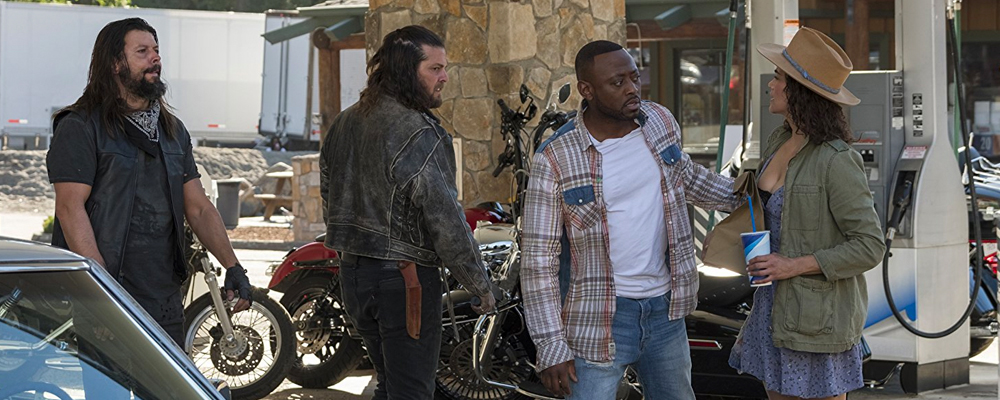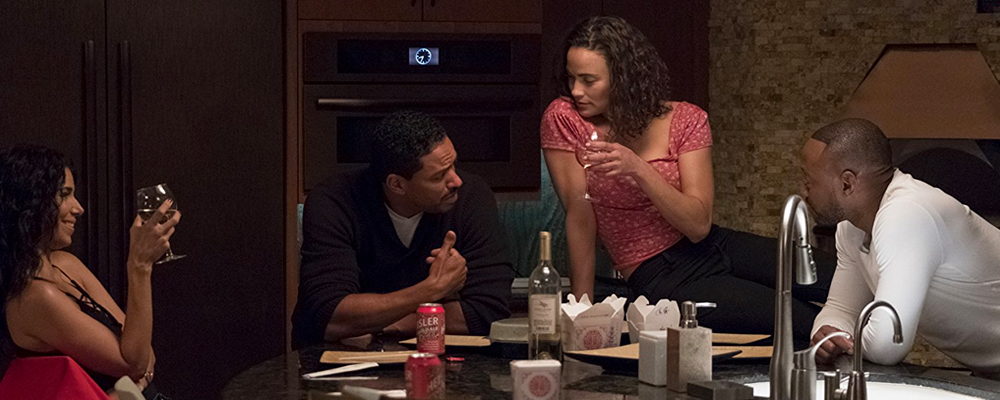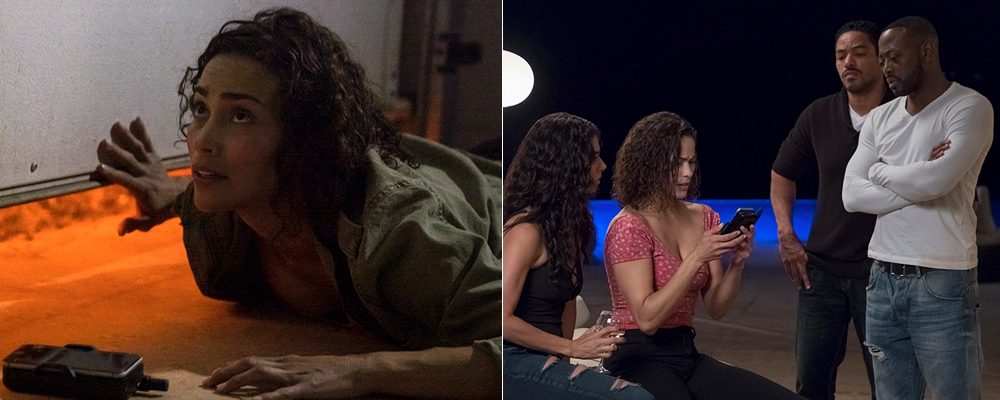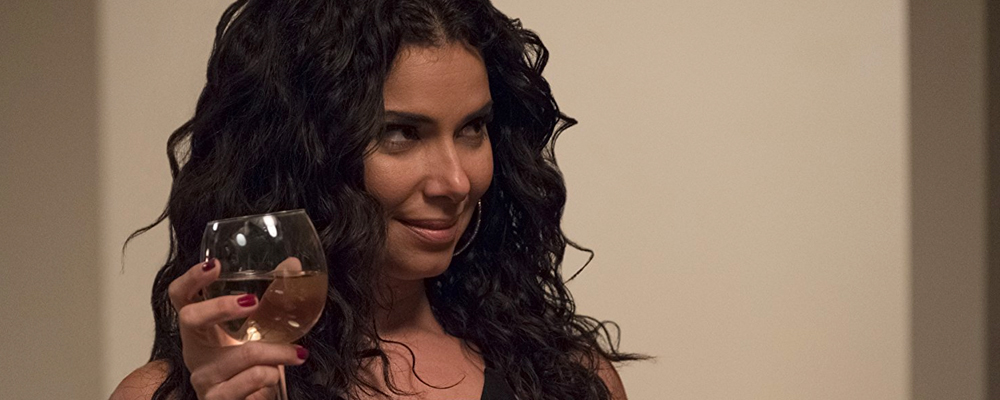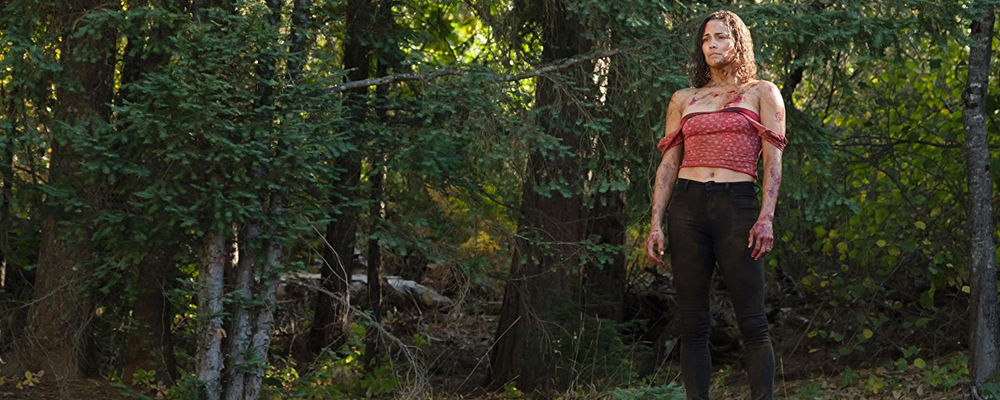Paula Patton and Omar Epps Talk Combating Modern-Day Slavers in Human Trafficking Thriller ‘Traffik’
Michael Amundsen
“Traffik” is a powerfully compelling thriller in which Brea and John, a couple played by Paula Patton (“Precious”) and Omar Epps (“Love And Basketball”), travel to an isolated estate where John plans to propose. Instead, their lives are threatened when they find themselves embroiled in a game of cat and mouse with a gang of bikers that are involved in a human trafficking ring.
Entertainment Voice recently sat down with writer/director Deon Taylor and his leading cast (Paula Patton, Omar Epps, Roselyn Sanchez, and Laz Alonso) to discuss this modern day scourge and how the movie changed their lives.
It was an email from his 12 year old daughter’s school that inspired writer/director Taylor to tackle the subject of human trafficking for his thriller “Traffik.” The email warned parents to be careful dropping their children off at the mall because kids were being trafficked.
“It hit me,” explained Taylor. “Is this real? I have never seen trafficking in my community. But there has been almost 50 girls abducted over three years and it was spiking up. Why didn’t I know that?
As he began to research further, the statistics just got worse. Domestically over 1.9 million women are abducted every year. Globally the number increases to 21 billion. All of this is to support a business that pulls in $150 billion annually.
“This is so disturbing, it haunted me. I was thinking about all this other stuff I was going to write but I said I gotta do this. I got to figure out a smart way to put a thriller or something on top of it to where we can wrap it so people can actually eat the candy. That was the hard part. Everything I was looking at was documentary style, hard-hitting things. That wouldn’t be sufficient to who I wanted to speak to. I wanted to open it up to be viewed as a thriller so they’d say, ‘Oh, I want to see that,’ and when you get there, you get a message.”
“I took a big step on the thing based on my daughter. I got to do something – say something to where 18, 19, 20 year old college girls could say, ‘Really? That could happen?’ Yes!”
Paula Patton was his dream choice to play the lead Brea, a courageous journalist who struggles with her life-long commitment to the boyfriend John who she loves deeply. To explore that love and possible marriage, John and Brea take a trip to an idyllic mansion set in an isolated and stunning mountain location. Taylor claims he had to beg Patton to take the part. “We need more black actresses to stretch out.”
“I don’t think anything prepared me for this,” Patton expressed how she came to the role and how she made it her own.
“You have a genre movie and sometimes characters and situations are not specific. Omar and I talked about it. It’s a great moment to explore human emotion. It feels like real love because it is. Brea is heroic. She sees the importance of more than one person’s life or even her own life. The bigger picture. In a life and death situation, some people take care of themselves and some people take care of others.”
When asked how he saw his character against this powerful ambitious woman, Epps offered this insight. “I wanted to be an everyman, to be relatable. What was fun for me was that he was the vulnerable one. It was refreshing to explore that.”
Patton contributed that in comparison to the trafficking world threatening them at that moment, “Their love and their sexuality is so different than what you’re seeing around them. It’s a human thing. You’re either kind or you’re not.”
To which Epps added, “nothing is cooler than not trying to act cool. You have to show it through action.”
In the movie, Brea and John unwillingly get on the bad side of a gang of human traffickers. Held up in a mountain retreat, they are joined by sports agent Darren (Laz Alonso) and his weary girlfriend Malia (Roselyn Sanchez). Darren, though he claims to be John’s best friend, is really a jerk in the way he treats Malia and his insensitivity to John and Brea. The scene where Malia and Darren finally come head to head is one of the most powerful scenes in the movie.
Alonso remembered what it felt like in more ways than one. ”I love that scene where you finally explode,” he said speaking to Sanchez. “You have a mean right hook too. I was like how many takes are we going to do this?”
Sanchez laughed and pointed out, “We had a very smart director. He was not afraid of anything.”
Both Patton and Sanchez found themselves working under very difficult situations.
Explained Patton, “I like falling into the deep end. I like running through the forest, sliding in the mud. As an actor, it makes my life easier.”
Sanchez told of the night they shot in a cold, dark mine. “Those were intense working conditions. I was severely uncomfortable. I hated everything. But I have jeans. I am covered. (But the other girls) are basically naked, freezing, miserable and not complaining.”
“I have never been a victim of human trafficking, so to be able to understand that world and the feeling is impossible. It’s impossible. You don’t think how common it is. Is it realistic how we present these girls drugged and abused. They have no soul anymore. They’re a body with no soul. What kind of pleasure can you get having sex with a woman …”
“Or a child,” Alonso added. “Usually it starts very early.”
Sanchez finished her thought. “Is what you see in the movie heightened? No, it’s spot on. It’s devastating.”
“Traffik” is an intense and brutal look at a very real and far too commonplace occurrence in the world today. Its cinematic success Taylor credits to his cinematographer, legendary Dante Spinotti, and his editor Melissa Kent.
“It’s like two movies. Dante is such an incredible cinematographer that he triggers everything in our body. We fought to have this movie open when it’s wide. It’s green. It’s visceral. They’re in love. The minute the doorbell rings (at the retreat), the movie turns into a noir thriller.”
“Melissa was the best “get” I ever had, outside of Dante. As a woman, she was able to fall into the character of Paula and Roselyn at a high angle.”
In conclusion, Paula Patton puts her finger on the over-riding message of the movie. “We call things for what they are. It’s not modern day slavery. It’s slavery in modern day. You have these suburbs that look idyllic and under the floorboards, you have women and children in slavery.”
“Traffik” opens April 20 in theaters nationwide.

